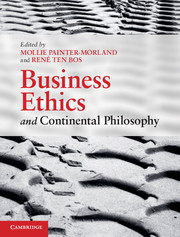Book contents
- Frontmatter
- Contents
- Figures
- Boxes
- Contributors
- Foreword
- Acknowledgements
- Introduction: critical crossings
- 1 Agency in corporations
- 2 Stakeholder theory
- 3 Organizational culture
- 4 Enron narrative
- 5 Moral decision-making
- 6 Organizational justice
- 7 Reward, incentive, and compensation
- 8 Leadership
- 9 Whistle-blowing
- 10 Marketing, bad faith, and responsibility
- 11 Corporate social responsibility
- 12 Corporate responsibility standards
- 13 Sustainability
- 14 Globalization
- Glossary
- Name index
- Subject index
- References
1 - Agency in corporations
Published online by Cambridge University Press: 05 June 2012
- Frontmatter
- Contents
- Figures
- Boxes
- Contributors
- Foreword
- Acknowledgements
- Introduction: critical crossings
- 1 Agency in corporations
- 2 Stakeholder theory
- 3 Organizational culture
- 4 Enron narrative
- 5 Moral decision-making
- 6 Organizational justice
- 7 Reward, incentive, and compensation
- 8 Leadership
- 9 Whistle-blowing
- 10 Marketing, bad faith, and responsibility
- 11 Corporate social responsibility
- 12 Corporate responsibility standards
- 13 Sustainability
- 14 Globalization
- Glossary
- Name index
- Subject index
- References
Summary
Goals of this chapter
After studying this chapter you will be able to:
understand the discussion of agency theory in business ethics;
understand how Deleuze and Guattari develop an alternative understanding of agency;
understand the implications of the move from identity towards multiplicity for discussions of corporate agency.
Introducing agency theory
One of the basic questions that business ethics is concerned with is the question of who is responsible for ethical failures in the corporate realm. If we feel disappointed in the quality of products or services we have paid for, or feel that our return on investment in a certain corporation is not satisfactory, or when corporate actions harm the environment, we typically feel that some wrong was done, and we want to hold the wrongdoer accountable. Questions that inevitably arise include: ‘How was the decision to harm my interests made?’, ‘Was this done intentionally?’, and ‘Who should be held accountable for this?’ These questions all assume that someone intentionally decided to act in a way that harmed others, that this is wrong, and that someone must pay the price for such wrongdoing.
- Type
- Chapter
- Information
- Business Ethics and Continental Philosophy , pp. 15 - 36Publisher: Cambridge University PressPrint publication year: 2011



